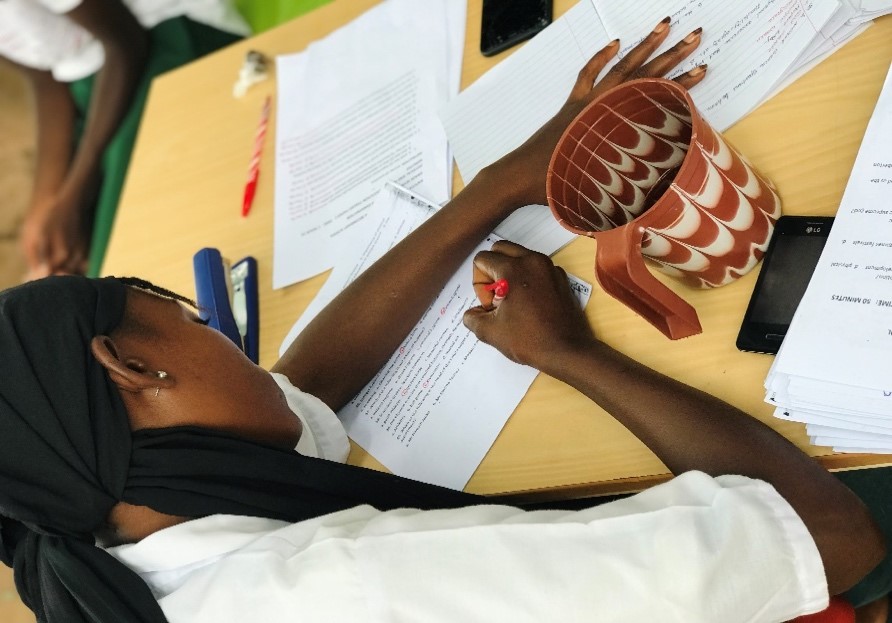Student of Kafuta Senior Secondary School reviewing past examination papers
Human capital development is crucial to the socioeconomic and political advancement of a society. Therefore, investing in the education and skills development of the youthful Gambian population willstimulate socioeconomic activities and generate an active, enlightened citizenry that can significantly inform and shape policy decisions. Given this centrality in development, the UNDP Gambia Accelerator Lab (hereinafter AcclabGM or the Lab), designed a comprehensive Education and Development portfolio that seeks to explore and adequately tap this development potential. In this drive, locally sourced education solutions have been mapped out ranging from digital learning technologies and community-based mediums, working with local and unconventional development partners.
Design and dissemination of E-learning Solutions
In the context of the COVID-19 pandemic , the Lab kicked-off a partnership with Gisqo, a local software development and digital marketing company, to design an e-learning platform to support students cope with the educational challenges posed by the pandemic. This partnership, supported by The Gambia’s Ministry of Basic and Secondary Education (MoBSE) culminated in the development of G-Quiz – a mobile friendly application that enables high school students, particularly those preparing for the WASSCE (West Africa Senior Secondary Certificate Examination) to get access to wide-range of educational resources.The G-Quiz app contains past WASSCE questions developed in a user-friendly manner for students to revise as they prepare for this sub-regional exam.
The primary beneficiaries for this e-learning solution are provincial schools, given their disadvantaged position in terms of accessing educational infrastructures and services. This was particularly exposed by the pandemic. Notwithstanding, research has recurrently showed considerable academic underperformance among provincial students compared to their urban counterparts in the WAEC exams.Bridging this educational gap is pivotal towards building an inclusive and sustainable development. In cognizance of this, AcclabGM, GISQO, and the Ministry of Basic and Secondary Education (MoBSE) embarked on a nation-wide tour to introduce the resulting innovation, a mobile application called G-Quiz. Part of the tour activity included supporting students to install the app and distribute access codes to schools across both rural and urban Gambia. A total of 78 schools were visited, representing 88% of the national coverage.
The ‘Library on Wheels’ project
More recently, the lab is leading and stimulating stakeholder intervention in the area of community education through solutions mapping field visits and engaging sister UN agencies such as UNICEF and UNESCO. This initiative is underpinned by the rationale that the establishment of community learning projects can perform the multi-purpose functions of providing educational materials, training and mentorship opportunities for deprived local communities. The Lab’s bourgeoning interest in community-based education is also inspired by the Gambia Community Library Project situated in Kafuta Village, in the West Coast Region. Through a field visit, it was uncovered that since the project’s inception in 2016, the community library benefitted over 10,000 students, predominantly in rural parts of the Gambia. It has, among other things, donated books to schools in several regions in the Gambia, including the Lower Region. The project also organizes extra extracurricular activities such as reading circles, lending books to children in a bid to improve reading skills at the local community level.
To replicate and pilot this initiative, the Lab has designed a ‘Library on Wheels’ project that seeks to provides access to books, learning and mentorship. The mobile library will help reach the remotest communities across the country—directly serve needy children— in efforts to improve their academic performance and bridge the rural-urban educational gap. This project will also integrate an e-learning component that provides rural students access to digital technologies and improved educational materials, and as well bridge the digital divide.
UNDP-UTG SDG Challenge and Lecture Series
Additionally, given AcclabGM’s role in foreseeing the on-going partnership between the UNDP and the University of The Gambia (UTG), it facilitated the inaugural SDG Lecture Series, where Prof. Joon Oh of the Korea Development Institute (KDI) presented on ‘The SDGs and National Development’. This program forms an integral part of the Memorandum of Understanding (MOU) signed in 2020 between UNDP and UTG in partnering on the localization of the Sustainable Development Goals (SDGs) in The Gambia. Since the establishment of this agreement, the Lab has been coordinating with the country’s main university to implement its maiden SDG Challenge.
The SDG Challenge, led by the UTG Students’ Union, is geared towards encouraging SDG centered student-led research and innovation-driven project with alignment to the Gambia’s national development plans. As part of this process, the students have initiated a three-day SDG Bootcamp to widen sudents’ understandings of the different thematic areas within the SDGs under the guidance of trained mentors. The camp contributed to enhancing planning, presenting, leadership, listening, and teamwork skills among UTG’s student body.
In conclusion, despite remarkable progress in providing access and inclusive education in The Gambia, considerable challenges such as lack of adequate learning spaces, materials, accessibility to trained teachers and mentorship remain unaddressed, particularly in rural areas. Notably, the outbreak of the COVID-19 pandemic has laid bare and exacerbated some of the longstanding educational challenges in the country. While trying to recover from the shocks of the pandemic, it is imperative that concerted efforts are channeled towards empowering schools and building e-learning capabilities are promoted and better supported in enhancing access and inclusivity within the education system in The Gambia.
The G-Quiz e-learning platform to support High School students prepare for WAEC and JAMB

 Locations
Locations
